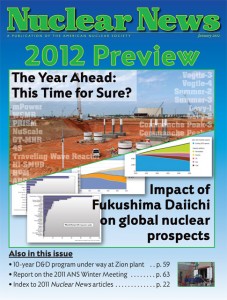A message from NV5, Inc.
Seconds Matter: Rethinking Nuclear Facility Security for the Modern Threat Landscape

A message from NV5, Inc.
Seconds Matter: Rethinking Nuclear Facility Security for the Modern Threat Landscape
It's hot out! Across much of the United States, the largest heat wave of the summer has been stagnating all week.
What's Next For Used Nuclear Fuel and Nuclear Waste Management Policy?
The nuclear energy industry is the only large-scale energy producer responsible for managing and storing (and paying for) all the wastes generated by the process [in contrast to, for example... dumping wastes into the atmosphere].
The 800 billion kilowatt-hours of electricity produced by the 104 nuclear reactors in the United States each year -- all while emitting no greenhouse gases -- is by far America's biggest source of green energy. And this abundant energy source can become even greener by recycling used nuclear fuel.
Integrating Storage, Transportation, and Disposal
Robert Alvarez has issued another misleading report about energy dense fuel materials, titled Managing the Uranium-233 Stockpile of the United States.
On September 11, the National Nuclear Security Administration (U.S. Department of Energy) hosted a public meeting in Chattanooga, Tenn., concerning its Supplemental Environmental Impact Statement on the disposition of surplus weapons-grade plutonium as mixed-oxide (MOX) fuel for use in power reactors. You may have seen the ANS Call to Action for the hearing and perhaps read the ANS position statement or background information.
On Wednesday, June 6, Dr. Mark T. Peters appeared on behalf of the American Nuclear Society before the U.S. House Foreign Affairs Subcommittee on Asia and the Pacific. Peters is the Deputy Laboratory Director for Programs at Argonne National Laboratory and testified at the invitation of the subcommittee.
 In 2009, the United States and the United Arab Emirates (UAE) signed a "123" agreement, which allowed the transfer of US nuclear technology (e.g., reactors, etc.) to the UAE. As a condition of the agreement, the UAE gave up all rights to enrich uranium or reprocess spent nuclear fuel, now and at any point in the future. Thus, the UAE agreed to give up significant rights that are granted to it as a signee of the nuclear Non-Proliferation Treaty (NPT).
In 2009, the United States and the United Arab Emirates (UAE) signed a "123" agreement, which allowed the transfer of US nuclear technology (e.g., reactors, etc.) to the UAE. As a condition of the agreement, the UAE gave up all rights to enrich uranium or reprocess spent nuclear fuel, now and at any point in the future. Thus, the UAE agreed to give up significant rights that are granted to it as a signee of the nuclear Non-Proliferation Treaty (NPT).
 Soon after declaring that it would end the Yucca Mountain repository project, the Obama administration created the Blue Ribbon Commission on America's Nuclear Future to reevaluate the nation's nuclear waste program and policies. The commission was asked to recommend improvements to the waste program and the Nuclear Waste Policy Act (NWPA), and to make general recommendations on the path forward. The commission was specifically instructed to not address the Yucca Mountain project, or any specific project or site. The commission's final report was released this month.
Soon after declaring that it would end the Yucca Mountain repository project, the Obama administration created the Blue Ribbon Commission on America's Nuclear Future to reevaluate the nation's nuclear waste program and policies. The commission was asked to recommend improvements to the waste program and the Nuclear Waste Policy Act (NWPA), and to make general recommendations on the path forward. The commission was specifically instructed to not address the Yucca Mountain project, or any specific project or site. The commission's final report was released this month.
The utility is assessing options to use it
 The January issue of Nuclear News magazine is available in hard copy and electronically for American Nuclear Society members (must enter ANS user name and password in Member Center). The issue contains the following stories:
The January issue of Nuclear News magazine is available in hard copy and electronically for American Nuclear Society members (must enter ANS user name and password in Member Center). The issue contains the following stories:
An advanced reactor could be used to consume 112 tonnes of weapons grade material
Last month, the Blue Ribbon Commission (BRC) on America's Nuclear Energy Future released its long-awaited full draft report to Secretary Chu, based upon the findings of each of its subcommittees. Several nuclear bloggers offered their thoughts on the draft summary of the BRC recommendations when they were posted back in May. Since that time, the release of the full draft report expands upon earlier BRC recommendations, which largely focused upon centralized interim storage for spent nuclear fuel until a new permanent geological repository can be sited.
The American Nuclear Society issues a comprehensive spent fuel report
 On May 13, the Blue Ribbon Commission on America's Nuclear Future released its draft conclusions and recommendations. Despite its more general sounding title, the commission's work mostly concerned the nuclear waste issue. It was created by President Obama's administration primarily to investigate alternatives to the proposed Yucca Mountain repository, after the administration moved to shut that program down. While the commission did release some recommendations on other issues such as advanced reactors and Fukishima, this post will focus on its recommendations concerning nuclear waste policy.
On May 13, the Blue Ribbon Commission on America's Nuclear Future released its draft conclusions and recommendations. Despite its more general sounding title, the commission's work mostly concerned the nuclear waste issue. It was created by President Obama's administration primarily to investigate alternatives to the proposed Yucca Mountain repository, after the administration moved to shut that program down. While the commission did release some recommendations on other issues such as advanced reactors and Fukishima, this post will focus on its recommendations concerning nuclear waste policy.
The D.C. Circuit Court of Appeals heard oral arguments on March 22, 2011, for the lawsuit brought by three private citizens of Washington State challenging the president's authority to cancel the Yucca Mountain nuclear waste repository.
The court will decide Yucca Mountain's future, not the president